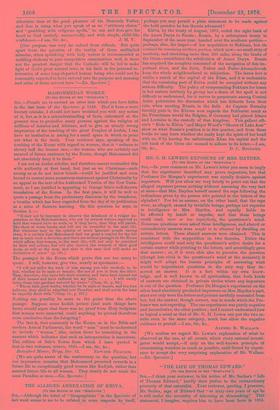MR. G. H. LEWES'S EXPOSURE OF MRS. HAYDEN.
[To THE EDITOR OF THE "SPECTATOR.") SIR,—In your comment on Mr. Lewes's letter you seem to imply that the experiment described may prove imposture, but that Professor De Morgan's experiment was equally decisive against imposture. Will you allow me very briefly to point out that the alleged exposure proves nothing without assuming the very fact at issue—that Mrs. Hayden herself caused the raps following the indications given by the person who pointed to the letters of the alphabet? For let us assume, on the other hand, that the raps were, as alleged, caused by invisible beings, perhaps not superior in intelligence to Mrs. Hayden, and equally liable to be affected by insult or impulse, and that these beings could read, more or less imperfectly, the questioner's mind. Nonsense questions were asked these intelligences, and absurd or contradictory answers were sought to be obtained by dwelling on certain letters. These absurd answers were obtained. This is consistent with the supposition on two theories. Either the intelligence could read only the questioner's active desire for a certain answer while pointing to the letters, and accordingly gave that answer ; or, if it were able also to perceive the question (though less vivid in the questioner's mind at the moment); it might well adopt the human principles of answering what would be impertinent questions in the only way they de- served an answer. It is a fact within my own know- ledge, and is well known to all spiritualists, that both kinds of answers are obtained in private circles where any imposture is out of the question. Professor De Morgan's experiment on the other hand absolutely precluded imposture on Mrs. Hayden's part, since not only were the letters and pointer carefully concealed from her, but the answer, though correct, was in words which the Pro- fessor was not expecting. The one experiment was purely negative and inconclusive, the other positive ; and I cannot understand how so logical a mind as that of Mr. G. H. Lewes can put the two re- sults even in the same category, much less allow the negative evidence to prevail.—I am, Sir, &c., ALFRED R. WALLACE.
[We confess we regard Mr. Lewes's explanation of what he observed as the one, at all events, which every rational investi- gator would accept, if only on the well-known principle of economising wonders as much as possible, until forced by experi- ence to accept the very surprising explanation of Mr. Wallace. —En. Spectator.]


































 Previous page
Previous page